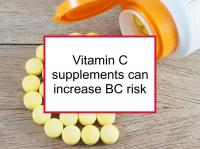After a great deal of attention to vitamin C as a potential cancer preventative during the 1980s and later as a cancer treatment, interest in vitamin C supplements has dwindled among cancer researchers. The primary reason for this reduction in research is disappointing and contradictory study results.
Generally speaking, vitamin C has not been found to prevent breast cancer. Vitamin C supplements appear to interfere with the effectiveness of treatment with tamoxifen and, possibly, radiotherapy. The impact of vitamin C supplementation during chemotherapy is unclear—while concern has been raised by some observers, a few studies have found a benefit. Several studies have also reported that vitamin C supplements are associated with reduced risk of breast cancer recurrence among survivors, although not all studies have found an advantage. Normally, the existence of contradictory results indicates that more variables need to be taken into account to explain the relationship between a micronutrient and breast cancer. Now a large new prospective study has reported that vitamin C supplement use is associated with increased risk of breast cancer in postmenopausal women who already have a high level of vitamin C intake from foods.
Latest research finds supplements can sometimes increase risk
The study referenced above was designed to investigate the associations between dietary and supplemental vitamin C and breast cancer risk. To conduct the study, the authors used data concerning 57,403 postmenopausal women in the Etude Epidémiologique auprès de femmes de la Mutuelle Générale de l'Education Nationale (E3N) prospective cohort. A total of 2,482 invasive breast cancers were diagnosed in E3N participants between 1995 and 2008.
A validated food-frequency questionnaire that had been mailed to study participants during the period 1993 to 1995 was used to estimate dietary vitamin C intake and questionnaires mailed in 1995, 2000, 2002, and 2005 were used to assess supplemental vitamin C intake. The women were divided into four groups (quartiles) based on their level of vitamin C consumption in foods (dietary intake of vitamin C).
Ever use of vitamin C supplements was not found to be associated with breast cancer risk overall compared with never use. However, vitamin C supplement use was associated with a 32% higher risk of breast cancer among women in the fourth quartile of dietary vitamin C intake. No such association was observed among women in the other three quartiles of intake. The authors comment that vitamin C supplement use was associated with increased risk of postmenopausal breast cancer in women with high vitamin C intake from foods in this cohort. This result suggests a U- or J-shaped relationship between total vitamin C intake and postmenopausal breast cancer risk that should be investigated further, according to the authors.
Please see our article on vitamin C for more information.
